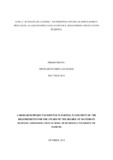| dc.description.abstract | We live in troubled economic times and financial literacy is increasingly becoming, not only
a national concern, but also a global concern. Financial markets have increasingly been
deregulated with rapid growth of financial products being experienced across many financial
markets. In this regard, it is becoming increasingly important for individuals to become aware
of their personal finances so as to ensure, them and their families are financially secure in the
longrun. This research project focuses on employees of financial institutions in Kenya and the
effect of personal financial literacy on their personal financial management practices. Two
fundamental aspects, including personal financial literacy and level of education, have been
considered in explaining personal financial management practices. A survey methodology
was adopted with the design of a questionnaire to capture information among the employees
of financial institutions in Kenya. The data collected from the respondents are tabulated and
analyzed into logical statements using percentage and mean score analysis. The study
revealed that personal financial management practices is greatly affected by personal
financial literacy levels and also to some extent, level of education, which was a proxy for
other cognitive factors affecting personal financial management practices. The study reveals
that employees of financial institutions are no better than other people with their personal
financial management practices despite their great exposure to financial literacy. The findings
further revealed that high education levels do not necessarily lead to financial literacy but
somewhat improve personal financial management practices. Nevertheless, the greatest factor
influencing personal financial management practices is personal financial literacy. Lack of it
therefore leads to poor personal financial management practices. Therefore, concerted efforts
among various stakeholders, including financial institutions, the government and institutions
of higher education are important in helping to promote financial literacy in Kenya. Increased
financial literacy will go a long way in enabling households, let alone employees of financial
institutions, to make informed decisions to budget, save and borrow thus enhance their
financial stability, ability to plan for the future and family welfare. This will also improve the
financial institutions industry by creating well informed employees and consumers as well,
thus reducing the risks for financial institutions. | en_US |

